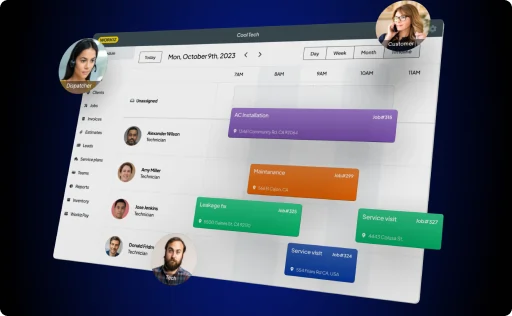This shift has given rise to the “gig economy,” where contractors and freelancers play a pivotal role. We will explore the process of becoming a contractor and why it has become an increasingly relevant and attractive option in various industries.
Understanding the role of a contractor
Contracting is a unique and rewarding career path that offers individuals the opportunity to work independently, manage their own businesses, and provide specialized services to clients.
As shown in the graph below, being a contractor can be very lucrative for those who make the right moves (a nice review of contractor salaries across the US).

Source: ConstructConnect
What is a contractor?
Before we go any further, it’s crucial to grasp what it means to become a contractor and what sets them apart from traditional employees.
Basically, a contractor, often referred to as an independent contractor or freelancer, is a self-employed individual or business entity that provides specific services, expertise, or products to clients or companies on a contractual basis. Unlike employees, contractors work independently and are typically hired for a predetermined project or timeframe.
They have control over their schedules, methodologies, and tools used to complete projects. This also comes with responsibility for paying self-employment taxes, including Social Security and Medicare taxes. You will also often need to make quarterly tax payments.
Benefits of being a contractor
Becoming a contractor offers several advantages, which make this career choice appealing to many individuals. Let’s take a look at some of these benefits:
- Flexible Work Arrangements. Contractors have the freedom to set their own schedules, allowing for a better work-life balance. This flexibility can be especially valuable for those who want to accommodate personal commitments or pursue multiple interests.
- Varied Projects. Contractors often have the opportunity to work on diverse projects for different clients, which can lead to a broader skill set and more stimulating work.
- Income Potential. Contractors can potentially earn more than traditional employees in the same field, especially as they gain experience and build a solid reputation. They can set their own rates and take on multiple projects simultaneously.
- Entrepreneurial Freedom. Contractors have the autonomy to run their businesses as they see fit. They can make decisions about marketing, client selection, and business growth strategies.

Challenges and responsibilities
While contracting offers many benefits, it also has its fair share of challenges and responsibilities. Let’s break it down so you get a better insight into the downsides.
- Financial Management. As a contractor, you’re responsible for handling your financial affairs, including budgeting, invoicing, and managing cash flow. Anything that involves saving money to cover taxes and self-employment expenses is solely on you. Using a tool like the Workiz contractors management platform would help you to effectively manage your cash flow and expenses.
- No Job Security. Being a contractor means you do not have the job security that comes with traditional employment. As a result, you must constantly seek new projects and clients to maintain a steady income.
- Healthcare and Retirement. Unlike employees, contractors are not typically provided with health insurance or retirement plans by their clients. They must secure these benefits independently.
Steps to becoming a contractor
Becoming a successful contractor involves a series of strategic steps. This section will guide you through these steps, starting with self-assessment and culminating in building a solid professional network. Let’s break it down further:
Step 1: Assessing skills and interests
Before embarking on your journey as a contractor, take the time to assess your skills, expertise, and interests. Understanding your strengths and areas of interest will help you choose a contracting path that aligns with your passions and capabilities. Consider the following:
- Skills Inventory: Make a list of your technical skills, such as carpentry, programming, plumbing, or design.
- Passions and Interests: Identify the areas within your field that genuinely interest you. What types of projects excite you the most? Are there specific aspects of your trade that you are particularly passionate about?
Step 2: Selecting a niche
While becoming a contractor, you must realize that choosing a specific industry or niche within your field is crucial for success. Specialization lets you focus your efforts, build expertise, and stand out in a competitive market. In this case, you will need to research the demand for services in your chosen niche. Analyze trends and growth potential to ensure a steady market for your skills. Select a niche that aligns with your interests and expertise. Passion for your work will drive motivation and excellence.
Step 3: Gaining relevant experience
Once you’ve chosen a niche, building a solid portfolio and gaining relevant experience is essential. Clients will want to see evidence of your skills and capabilities. It would be best to build your credentials, and you can do this in various ways.
If you’re new to the niche, consider volunteering or interning to gain practical experience. This is an excellent way to learn, build connections, and add real projects to your portfolio.
Step 4: Legal and financial preparation
Contractors must navigate various legal and financial aspects of their businesses. Depending on your location and business structure, you may need to register your contracting business with the appropriate authorities. This is why you need to know how to become a licensed contractor.
Certain tax obligations come with being a contractor. Consider consulting a tax professional to help you set up a tax management system, including self-employment taxes and deductions.
Step 5: Building a network
Networking is a cornerstone of success for anyone looking at how to get into contracting. Building relationships with potential clients, industry peers, and other contractors can open doors to opportunities. Here are some networking strategies that you can use:
- Attend trade shows, conferences, and local industry events.
- Create a professional online presence through a website and social media profiles. Share your work, connect with others in your field, and join relevant online forums or groups.

Setting up your contractor business
Now that you know the steps to become a contractor, you might want to run your own business in the field.
Starting a contractor business involves important decisions about your business structure, planning, marketing, and establishing clear contracts with clients. Basically, you need to know how to be a general contractor, and in this section, we’ll explore these key aspects of setting up your contractor business:
Choosing a business structure
Selecting the right business structure is critical as it affects your legal responsibilities, taxation, and personal liability. Here are the common options:
- Sole Proprietorship: This is the simplest structure where you operate as an individual. You have full control over the business but also bear personal liability for debts and obligations.
- Limited Liability Company (LLC): An LLC offers personal liability protection, separating your personal assets from business debts. It provides flexibility in management and taxation.
- Corporations: Corporations, such as S-Corps or C-Corps, offer the highest level of personal liability protection. They require more formalities and paperwork but can be advantageous for larger businesses.
Choosing the right structure
Now, you have the opportunity to choose the perfect structure that suits your preferences. To pick the right one, you need to consider your business goals, size, and the level of personal liability protection you need.
Many contractors start as sole proprietors or opt for an LLC due to their simplicity and flexibility. But if you need further advice, consult a legal or financial advisor to make an informed choice.
Business plan and marketing
A well-crafted business plan is your roadmap to success. This is why creating a business plan is essential as you embark on your journey as a contractor. It not only provides you with a roadmap for achieving your goals but also serves as the foundation for effective marketing strategies.
Your business plan should begin with a clear definition of your goals and objectives. What do you aim to achieve as a contractor? These objectives will shape your path forward.
Developing your marketing strategies
Once you’ve defined your goals and understood your target market, it’s time to develop your marketing strategies.
In today’s digital age, having a strong online presence is paramount. Set up and maintain active social media profiles on platforms relevant to your industry. Share informative content, including project updates, tips, and industry news.
Networking and referrals are also powerful tools. Depending on your budget, you might want to invest in online advertising, such as Google Ads or social media ads, to reach a broader audience.
Contracts and agreements
Clear, well-structured contracts and agreements with clients are the backbone of a successful contracting business. They play a multifaceted role, serving as legal protection, a source of clarity, a guarantee of payment, and a testament to professionalism.
You can use these practical tips to draft effective contracts:
- Project Scope: Clearly list deliverables, milestones, and any constraints. Use precise language to avoid any misunderstandings.
- Payments: Specify your payment structure comprehensively. Outline your rates, deposit requirements, invoicing schedules, and accepted payment methods to leave no room for ambiguity.
- Deadlines: Set realistic deadlines for project milestones and completion. Detail any penalties or consequences for delays and explain the process for requesting deadline extensions.
- Legal Review: Always take some time to review your contracts with a legal professional to ensure they align with local laws and regulations. This can provide an extra layer of protection for your interests.

Finding and securing contracts
Once you’ve embarked on the path to becoming a contractor, the next crucial step is finding and securing contracts. Whether you’re a construction professional, an IT specialist, or any other type of contractor, a consistent flow of projects is vital for the success of your business.
Here are some ways that’ll help you achieve that in no time.
Job platforms and freelance websites
Freelance websites have become integral for contractors seeking contract opportunities.
However, you need to choose the right platform for your field. For example, Upwork, Fiverr, and Freelancer are great platforms that cater to freelancers across diverse sectors, while platforms like Procore focus on the construction industry.
Create a compelling profile that highlights your skills, experience, and expertise. Use a professional photo, craft a clear bio, and provide detailed information about your services. All these are aspects that could attract potential clients.
Cold outreach and networking
Cold outreach and networking are powerful ways to connect with potential clients directly and establish meaningful relationships.
To make the most of them, you can begin with email outreach. Try to craft concise and personalized emails that introduce your services. Also, ensure you convey the value you can provide to the recipient. Throughout your outreach efforts, emphasize your unique value proposition.
Showcasing your portfolio
Showcasing your portfolio the right way can set you apart from competitors and demonstrate your capabilities. You can create an impressive portfolio by selecting the best examples of your work and ensuring it includes a variety of projects to illustrate your versatility and expertise in different areas.
Keep in mind that quality matters more than quantity. If applicable, include before-and-after visuals to highlight the transformation your work can achieve.
Pitching and proposals
If you’re looking to land and win contracts, then you need persuasive project proposals. One way to go about this is to clearly outline how you plan to solve the client’s problem or meet their needs. Make sure you are specific and detail-oriented in your approach.
Customers also want to feel valued and assured that they are getting a good deal. So, you should highlight the benefits the client will gain from your services, such as increased efficiency, cost savings, or improved quality.

Excelling as a contractor
Contracting can be a rewarding but demanding career. To excel in this field, contractors must master various aspects of their profession. That also comes with knowing how to become a licensed contractor if you don’t already have one.
Here are some aspects you should work on if you want to stand out and be successful in this profession.
Time management and organization
Effective time management and organization are the cornerstones of a successful contracting career. This may initially seem daunting, but there are ways to handle this. You can begin by evaluating all your ongoing projects and identifying their importance, deadlines, and dependencies. Then, prioritize tasks based on urgency and significance. Tackling high-priority tasks first ensures that critical deadlines are met.
Also, consider investing in project management software to track project timelines, allocate resources, and collaborate with your team effectively.

Client communication
If you’re going to make a long-term success from contracting, then you can’t afford not to be an effective communicator with your clients.
You can manage client interactions effectively by setting clear expectations from the outset. Discuss project scope, timelines, and deliverables thoroughly with your clients to avoid misunderstandings.
Also, do your best to provide regular progress updates, as transparency about project status helps build trust and manage expectations. Be open to feedback and handle it professionally. Constructive criticism can lead to better project outcomes and satisfied clients.
Continuous learning
Staying ahead in contracting requires a commitment and willingness to continue learning. That’s right, learning never stops. Regardless of how good you think you’ve become, there’s always room to get better, and there are new developments you should keep yourself abreast of.
And for more practical experience, you can attend industry-specific workshops, seminars, and conferences. These events provide networking opportunities and expose you to the latest industry developments.
Managing finances
Understanding and managing your finances is crucial whether you’re an independent freelancer or running a small contracting business.
To help you with this, you can use business management software like the Workiz app to track your income and expenses. This helps you maintain financial clarity that outlines your expected income and expenses.
Conclusion
Becoming a contractor offers numerous benefits, including the potential for increased income, flexibility in your career, and personal growth by acquiring new skills and experiences.
Now is the time to take action. We’ve covered all you need to take the right step in having a successful contracting journey.

FAQs
What degree do you need to be a contractor?
Typically, a specific degree is not required to become a contractor. However, many contractors have backgrounds in fields like construction management, engineering, or related trades. What’s often more important is gaining relevant experience, obtaining necessary licenses, and developing the right skills for your chosen contracting field.
What do I need to become a contractor?
To become a contractor, you generally need a combination of education, experience, and licensing, which can vary by location and specialization. These often include gaining industry experience, obtaining required licenses or certifications, and building a strong network within your chosen field.
How to become a home contractor?
To become a home contractor, you typically start by gaining hands-on experience in construction or a related field. Next, consider obtaining relevant licenses or certifications, like a contractor’s license. Building a reputation and a network of clients is also crucial in this field.
How to become a construction contractor?
Becoming a construction contractor often involves several steps. First, gain experience in the construction industry, possibly through an apprenticeship or working as a journeyman. Then, pursue the necessary licenses and permits required in your area. Building strong relationships with suppliers, subcontractors, and clients is key to success in this field. You can gain formal education in construction management for a more comprehensive understanding.
How long does it take to become a contractor?
The time it takes to become a contractor can vary widely depending on factors such as your chosen specialization, location, and educational path. Some contractors can start their careers relatively quickly with hands-on experience, while others may spend several years acquiring the necessary qualifications and building their reputation. On average, it takes two to four years to complete a degree in construction, depending on your preferred area of specialization.










